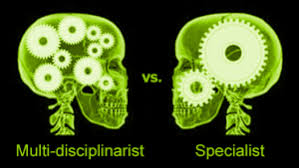Are you tech-savvy or market-savvy? A team player or rugged individual?
How to augment your personal and team commercialization abilities.
Technology commercialization is a very specialized function, one that is commonly undertaken by a team of people with diverse talents, or uncommonly by an individual who combines that multiplicity of talents. Imagine though a combination of these approaches, a team of these uncommonly synoptic individuals – how valuable would they be? What could they accomplish? And how could you become one of those team members?
If we compare a specialist with a multi-disciplinarist we find that in an ever changing environment the person with one strong attribute succeeds completely in only a few encounters whereas the person with both technical and business acumen is more adaptable succeeds in many situations. Which one are you now and which would you prefer to be in five or ten years? Your future is affected by but is not determined by your personal history. It is time to move on and grow.
A person’s schooling and background might be along a technical line but a gut-feel might move him to study and work in another field. The Wright brothers were interested in all things mechanical from  printing presses to bicycles and without the benefit of higher education followed their collective gut to investigate the concepts of kites, gliders, and finally powered aircraft. That would seem to put them firmly into the realm of the technologist but that did not limit them as they benefitted from commercialization of their technology with flying schools, defense contracts, and patent suits. Alexander Graham Bell followed a similar path, dropping out of school at age 15, although he expressed an interest in the sciences. He went on with a career that combined technical innovation with a real command of business principles. One aspect alone, only technology or only interpersonal skills, could not yield such success.
printing presses to bicycles and without the benefit of higher education followed their collective gut to investigate the concepts of kites, gliders, and finally powered aircraft. That would seem to put them firmly into the realm of the technologist but that did not limit them as they benefitted from commercialization of their technology with flying schools, defense contracts, and patent suits. Alexander Graham Bell followed a similar path, dropping out of school at age 15, although he expressed an interest in the sciences. He went on with a career that combined technical innovation with a real command of business principles. One aspect alone, only technology or only interpersonal skills, could not yield such success.
Inventions and novel technical concepts are usually the fruits of analytical thinking that is fostered in a pursuit of math and the physical sciences. The development of business operational concepts usually result from a study of psychology and interpersonal relationships. Shy of sociopaths all people have a blend of these two strengths in wide-ranging ratios. So long as a person realizes the value of these personality aspects they could work to better develop the weaker aspect or to augment the personal strengths with colleagues who have the required complementary assets.
Regardless where one is in the progress of a career there is always room for personal value enhancement. It simply requires a commitment of time and a dedication to the job at hand.
If your background is in the sciences then reading publications and taking classes in sales and marketing, business management, or technical writing would give you the broadened perspective needed to become part of or indeed lead a team for technology commercialization. Likewise if your background is in the humanities then using those interpersonal skills in conjunction with a code-writer would lead one to study information modeling, user interface design, and business analysis.
 Business has transitioned from a world of generalists with a collection of outdated tools to a collection of specialists with state-of-the-art abilities to an environment today where success and indeed survival requires a multi-focused approached. On a personal level this means a dedication to continued education beyond one’s core strengths, and on an organizational level a commitment to cross-training within and across departmental bounds. If you do not have a plan for personal growth then consider the benefits this could bestow upon you, and if your company does not have such a corporate-wide policy then formulate such a strategy with details and with an argument strong enough to support it. Both you and your company would benefit.
Business has transitioned from a world of generalists with a collection of outdated tools to a collection of specialists with state-of-the-art abilities to an environment today where success and indeed survival requires a multi-focused approached. On a personal level this means a dedication to continued education beyond one’s core strengths, and on an organizational level a commitment to cross-training within and across departmental bounds. If you do not have a plan for personal growth then consider the benefits this could bestow upon you, and if your company does not have such a corporate-wide policy then formulate such a strategy with details and with an argument strong enough to support it. Both you and your company would benefit.


Comments are closed